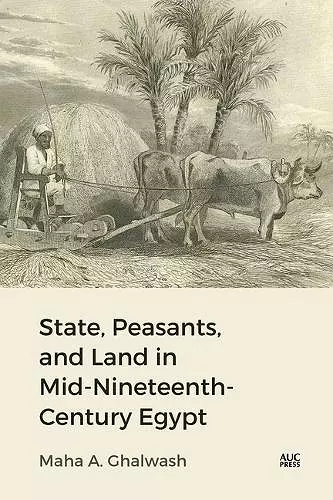State, Peasants, and Land in Mid-Nineteenth-Century Egypt
Format:Hardback
Publisher:American University in Cairo Press
Published:16th May '23
Should be back in stock very soon

An alternative reading of the relationship between the state and smallholder peasants in mid-nineteenth-century Egypt
This book examines the rural history of Egypt during the middle years of the nineteenth century, a period that is often glossed over, or altogether forgotten. Drawing on a wide array of archival sources, some only rarely utilized by other scholars, it argues that state policy targeting the peasant land tenure regime was informed by the dual economic principles of the Ottoman, or traditional, philosophy of statecraft, and that the workings of the relevant regulations did not produce extensive peasant land loss and impoverishment.
Maha Ghalwash presents a rich, detailed analysis of such crucial issues as land legislation, tax impositions, the system of tax collection, modes of land acquisition, large-scale peasant abandonment of land, the emergence of surplus lands, the formation of large, privileged estates, distribution of village land, female land inheritance, and the nature of peasants’ political activity. In investigating these issues, she highlights peasant voices, experiences, and agential power.
Traditional interpretations of the rural history of nineteenth-century Egypt generally specify an avaricious state, so indifferent to peasant well-being that it consistently developed harsh policies that led to unremitting, extensive peasant impoverishment. Through an examination of the relationship between the absolutist state and the majority of its subject population, the peasant smallholders, during 1848–63, this study shows that these ideas do not hold for the mid-century period.
State, Peasants, and Land in Mid-Nineteenth-Century Egypt will be of interest to students of Middle East history, especially Egyptian rural history, as well as those of peasant studies, subaltern studies, gender studies, and Ottoman rural history.
"[M]akes a significant contribution to our understanding of how rural policies were crafted. . . . Rich with detail and well-organized, this book provides a panoramic view of the realities of village landholding in the mid-19th century."—International Journal of Middle East Studies
"Through examination of a remarkably rich collection of land registers, court records, government documents, and more, Maha Ghalwash weaves a nuanced and compelling narrative about Egyptian peasants during the mid-nineteenth century. She draws on the voices of the villagers, and how they negotiated with a centralized government, to introduce an alternative perspective on the nature of their relationship with the state. This book is a must read for anyone interested in the history of rural Egypt during a decisive period in the country’s modern state formation.”—Zeinab Abul-Magd, Oberlin College
"An impressively thorough and meticulous book, which challenges the conventional wisdom and breaks new ground in our understandings of peasant land tenure and peasant–state relations in mid-nineteenth century Egypt."—John Chalcraft, London School of Economics and Political Science
"This empirically driven study weaves together a critical reading of state policies with a close attention to peasant voices. Maha Ghalwash offers a vivid picture of rural society in mid-nineteenth-century Egypt that invites us to rethink the role of global markets, dynastic politics, notions of justice, and peasant agency. The result is a truly revisionist account of Egypt in the middle decades of the nineteenth century."—Khaled Fahmy, Tufts University
“In this cogently argued and extensively documented survey, Maha Ghalwash sheds new light on a period of Egyptian history that is usually dismissed as static if not retrograde. Equally important, she enhances our understanding of the institutions and procedures of governance in Egypt’s agrarian provinces at a moment when private landholding and market dynamics were superseding communal property rights and overtly regulated transactions. Anyone who wishes to explore the multifaceted economic transformation that reconfigured the Middle East during the mid-nineteenth century can now complement path-breaking scholarship on Ottoman Syria and Anatolia with the arguably more consequential case of Khedival Egypt.”—Fred H. Lawson, Mills College
“It is refreshing and reassuring to find a historian who bases her work on detailed archival research and who is unafraid to go against the political tides which see the rich and powerful—and modern capitalism—as an all-powerful evil force.”—Patrick Clawson, Middle East Quarterly
ISBN: 9781649032775
Dimensions: unknown
Weight: unknown
328 pages